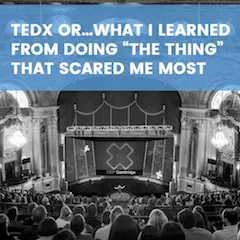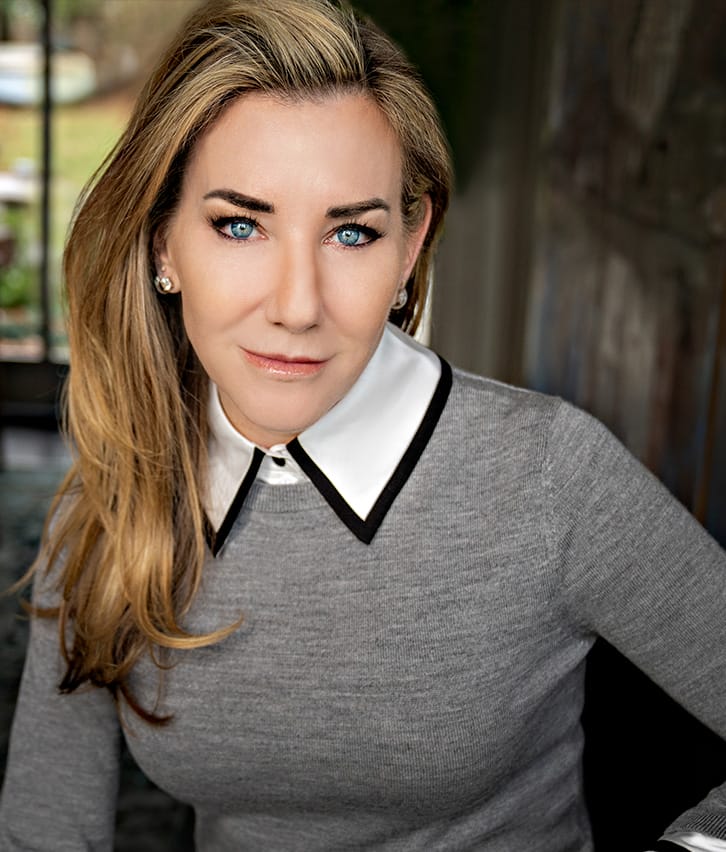Driving my 8th grader home from school one day, I received a call from a friend who happens to be the executive producer of TEDxCambridge. Knowing she was in a bit of a career transition — one that I had energetically encouraged — I felt the responsibility to take the call to make sure everything was going smoothly; being a conscientious, role-modeling mother, I also felt the responsibility to take it hands-free through my car’s speakers. Turns out that the call wasn’t about her career; it was about mine.
Her: “I’ve been reading your latest blog posts. There’s good stuff there. Would you be interested in applying to do a TEDxCambridge talk in front of 2,600 people at the Boston Opera House this spring?”
Me: “Um, hell to the no. That’s scary as fuck. Thanks, but I’ll pass.”
And, that’s where all of my excellent parenting (open car cursing notwithstanding) comes back to bite me in the butt.
Him: “Mom, you tell me ALL THE TIME to do that thing which scares me the most. You tell me ALL THE TIME that if my goals don’t petrify me, I’m not setting them high enough. And, you tell me ALL THE TIME that pushing myself into areas where I’m uncomfortable is where the actual growth happens. So, um, what gives, huh?”
Me: “Fuck.”
Fast forward six months, and I’m all mic’d up and hyperventilating backstage, realizing that I’m about to walk out, sans podium, sans notes, sans any protective armor whatsoever, in front of the brightest lights and fullest house, and just hoping to every possible religious deity that I won’t crap my pants.
(Spoiler alert: I didn’t.)
But, I did learn a few things.
-
There is nothing louder than the deafening silence of 2,600 people waiting on your next thought.
It was like I could hear every single one of them breathing. Every. Single. One. The room was heavy with their silence. But my Monkey Brain was screaming: “Congratulations! You nailed the opening. They are loving you! Except that guy in front. Why is he making that face at you? But, the woman next to him looks interested and eager. She is eating out the palm of your hands! Now don’t screw up your mic drop line…”
The cacophony of self-doubt, of uncertainty, of insecurity is a din that will drown out even your most cogent thoughts if you let it take over. Wrestling the Monkey Brain into submission means having confidence in your story and your voice. You have to believe in your idea, and you have to believe in yourself as its messenger.
It remains thusly in large arenas as it does in intimate settings and individual conversations. But, we get nervous, and we blather to fill the awkward gaps. We rush to the very next idea and, in doing so, we rob the audience of the precious gifts of acknowledging, of understanding, of internalizing that very thing that the well-timed pause and the patient cadence facilitates. The audience member places in us the trust of this dialogue, even if theirs is an unspoken role, but when we talk over their lines — their unspoken reactions, questions, thoughts, enjoyment — we cut them off at the knees.
-
The energy comes from you and you alone.
From the minute I walked onto the stage, it felt obvious to me, in my core, that the audience was there for a collective experience. They had self-selected to come to a TEDx event, and their expectations wrapped around me like a hug. They thirsted for knowledge, they yearned for excitement, they sought transformation. And, it was my job, and my job alone during my 12 minutes of stage time, to grab them and hoist them onto my shoulders, and carry them there. They were willing participants in this journey, but it was clear that I was the designated driver.
Doing this meant walking a fine line between performance and authenticity. As an introvert who knows how to “put on” the extrovert face, this was a huge challenge. I found myself slipping into “speaker voice” too often during rehearsal and losing the energy of the vulnerable parts of my story to the more protected presentation style beaten into me from years of board presentations. A talk is nothing like a speech, is nothing like a presentation. Each of the forms of communications is an art in and of themselves and each relies upon the speaker alone to provide a different energy that distinguishes one from another.
It wasn’t until my coach told me to just say “Fuck it!” (literally, “I want you to walk onto that stage and just say ‘Fuck it!’ under your breath before you start speaking”) that I began to feel the real me come through. It was my story, it was my message, it was my idea. And it had the power to change people’s mindsets. But, without my authentic voice, it was nothing. It needed my humor, my charm, my irreverence, and my passion. Giving that was a mental, emotional, and physical act, the likes of which I’d underestimated by a factor of ten. But, I’ll never not do it again. “Fuck It” is my new normal. This was the truest form of consonance I could find.
Side note: if you are an introvert, even one like me who can play an extrovert on stage, know that the introvert hangover is real and all-encompassing. Waking up the next morning, it felt like I’d just gotten off of a plane from Japan, such was the fog of jetlag that clouded my brain and body. I have never felt such exhaustion in my life, and I’ve give birth to two children and run three marathons. I didn’t expect it, I didn’t plan for it, and I didn’t take it seriously once inflicted. That was a huge fucking mistake. Schedule self-care, in whatever form refills your cup, and thank me later.
-
Not everything is as important as you think, or hope. And no one knows what you didn’t say.
During training and rehearsals, there were stories woven throughout my talk which I just couldn’t deliver well enough. Each time, I’d screw up this line or that line, or tell the second half first and end up in a dead end. These stories were important and central and I was determined to get them right. My coach offered that perhaps I couldn’t nail them because they just didn’t belong. I didn’t believe her, and I was clinging to the sunk cost of the research that I’d done and the writing that I so painstakingly wrapped around that work. I didn’t believe her, but I trusted her; I tried the talk without those stories, et voila, the talk was tighter, shorter, and more powerful. No one would miss all of the perfect analogies and deeply researched examples that they actually didn’t need to hear and never knew existed. My coach forced me to be ruthless. And, it was perfect, not to mention easier to remember. I felt in the zone and was ready.
But then, during the live talk itself — the big show! — nerves got the better of me, and I still screwed up. And I don’t just mean little screw ups; I death spiraled into a tailspin that led me to forget a few lines that were, well, pretty important to the overall context of the shorter, tighter powerhouse of a talk. Only a small handful of people knew, from my coach who worked with me on every word, to my poor husband who knew he’d have an inconsolable wife on his hands, to that 14-year-old who stuck by me throughout so many practices. Mostly, it still hung together. Mostly, nobody noticed the sideways glance of sheer panic. Mostly, I got my point across. About 2,597 people, in fact, were clueless. But, I knew.
And, oh how I knew. I knew from the moment I walked off stage. I knew deep in my Monkey Brain which woke me up reciting those lines all night long for weeks after the stage lights went dim. And, I’ve known for every second since. Focusing on the 11:30 minutes I got right — that I will even admit I fairly well crushed — is proving to be a whole lot harder than forgetting the :30 seconds I messed up. I don’t suppose that piece gets any easier. But, I also know that this very continuous drive for perfection is what got me to that stage in the first place, so sue me.
-
Stack the deck.
Every one of us will get that call that excites us and scares us in equal parts. It might be professional, it might be personal. Say yes. Figure out the path forward later. For me, that path was my coach, my friend, and the Executive Producer of TEDxCambridge, Tamsen Webster. She is my Yoda. The shaping of this idea, its message, and its transformative potential have all come from her and her understanding of the power of consonance. If ever your work calls you to the stage, and if you find that you have the resources to invest in yourself (or your company wants to hire a trainer for your staff), you’d be folly not to make her your first call. In Tamsen I trust, even down to helping me say “Fuck it” about those last :30 seconds.
-
“Ideas Worth Spreading” should be spread.
It took a lot to get on that stage, to believe that my idea was one worth spreading. It might not have all rolled off my tongue perfectly, but the kernel of the idea still stands. Yet, it means nothing if it’s never heard. So, the last lesson is this: have confidence in your ideas, and ask people give them a listen with an open mind and a kind heart.
And, with that: take a few minutes and check out my TEDx talk.



